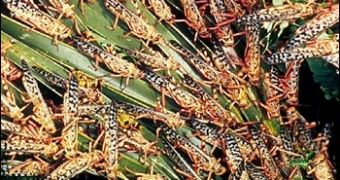The news has just broken that more than half of Madagascar is now dealing with a major locusts infestation that very much resembles the biblical plague.
Due to the fact that these insects are well known for their ability to feed on whopping amounts (i.e. about 100,000 metric tons) of vegetation and crops on a daily basis, it need not come as a surprise that the people living on this island are desperate to see this plague dealt with as soon as possible.
More so given the fact that, according to several estimates, roughly two thirds of Madagascar's entire surface might be affected by this plague by this year's September unless something is done to keep the insects from further breeding and spreading.
Specialists warn that the locusts' feeding on Madagascar crops stands to compromise long-term food security, and leave the country's high officials with no choice except reach out for food aid.
As explained by Dominique Burgeon, the current director of the FAO emergency and rehabilitation division,“Failure to respond now will lead to massive food aid requirements later on.”
Information shared with the public by the UN says that, all things considered, a total of $41 million (€32.03 million) will have to be spent on tackling the infestation.
Of these, $22 million (€17.18 million) will be used to pay for an aerial spraying campaign which is to target the country's affected regions and which should be completed as early as this year's June.
The remaining $19 million (€14.84 million) is to be spent on helping the country overcome the damages caused to its agricultural systems and to its natural ecosystems.
As well as this, some of this money will serve to make sure that the locusts do not stand a chance at making a comeback.
It is believed that this so-called recovery phase will last for about three years, RedOrbit informs us.
Annie Monard, one other specialist working with FAO, wished to stress the fact that, “We know from experience that this plague will require three years of anti-locust campaigns.”
“Campaigns in past years were underfunded, and unfortunately it means not all locust infestations were controlled,” Annie Monard further added.

 14 DAY TRIAL //
14 DAY TRIAL //